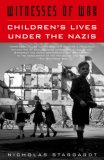Summary | Excerpt | Reviews | Beyond the Book | Readalikes | Genres & Themes | Author Bio

Critics' Opinion:
Readers' Opinion:
First Published:
Jan 2006, 512 pages
Paperback:
Jan 2007, 528 pages
 Book Reviewed by:
Book Reviewed by:
BookBrowse Review Team
Buy This Book
If we get into a real war with England, don't you think it will last at
least two years? For once he starts a war the Englishman throws
everything into it and mobilises his whole empire, for the Englishman
has never lost a war yet.
Her father, a reserve officer who strongly supported the regime, agreed.
As might be expected from someone with experience of the terrible
blood-letting of the First World War, he told her that France remained
the key. Meanwhile, Liese's mother purchased a good-quality radio, a
Telefunken-Super, and they set up a map of Poland next to it so
that—just like in schools across the Reich—they could mark the advance
of the German troops on it with little swastika flags after each news
broadcast.
When the German attack began at dawn on 1 September, the Wehrmacht found
the Polish Army still in the midst of mobilisation. With the advantage
of surprise, the Luftwaffe destroyed many of the 400 largely obsolete
planes of the Polish Air Force on the ground, gaining immediate air
supremacy. Thereafter, its 2,000 aircraft practised their new tactics of
war, giving battlefield support to the German Army, while its sixty
well-armed divisions swept over the borders from East Prussia in the
north, Slovakia and the recently occupied Czech lands in the south, and
along a broad front in the west stretching from Silesia to Pomerania.
Defending such borders was impossible, and the Polish High Command
abandoned its attempt to do so on 6 September. Even the attempt by the
Poles to defend the major industrial and urban centres involved
spreading their forty ill-equipped divisions and 150 tanks too thinly;
the Wehrmacht could pick out its battleground and concentrate its 2,600
tanks there.
As Germans flocked to the cinemas, far more eager to see the newsreels
of the war—the Wochenschau—than the feature films which
followed, their senses were bombarded with a new and sensually
stimulating kind of photography. Aerial photography had been tried out
since the First World War, but now the spectators could feel themselves
being swept downwards in a furious nosedive, at a speed of over 330
miles per hour. For once, police reports showed satisfied audiences, as
they viewed the Polish campaign through the eyes of the German
dive-bomber pilots. Small children in Essen queued up to jump off the
chicken coop, screeching "Stuka!" as they mimicked their screaming wail.
By late September 1939, the well-informed American journalist William
Shirer could find no one in Berlin, "even among those who don't like the
regime, who sees anything wrong in the German destruction of Poland."
Marion Lubien from Essen was one of many German teenagers who kept war
diaries. On 3 September, she noted the capture of Tschenstochau (CzeÛstochowa),
on 6 September, "the industrial area of Upper Silesia virtually unharmed
in German hands," and on the 9 September her bulletin read, "Lodz
occupied. The Führer in Lodz." But this fourteen-year-old girl kept to
the clipped and stilted language of the Wehrmacht bulletins to the home
front. Like most of the rest of the country, she may have been glued to
the radio, fascinated by the first newsreel images, and temporarily
intoxicated with a sense of victorious power—but the war itself remained
distant and unemotional. Not until the first bombs fell near her house
in October 1940 would her chronicle of the war leap into the first
person.
Excerpted from Witnesses of War by Nicholas Stargardt Copyright © 2006 by Nicholas Stargardt. Excerpted by permission of Knopf, a division of Random House, Inc. All rights reserved. No part of this excerpt may be reproduced or reprinted without permission in writing from the publisher.





The Flower Sisters
by Michelle Collins Anderson
From the new Fannie Flagg of the Ozarks, a richly-woven story of family, forgiveness, and reinvention.

The House on Biscayne Bay
by Chanel Cleeton
As death stalks a gothic mansion in Miami, the lives of two women intertwine as the past and present collide.

The Funeral Cryer by Wenyan Lu
Debut novelist Wenyan Lu brings us this witty yet profound story about one woman's midlife reawakening in contemporary rural China.
Your guide toexceptional books
BookBrowse seeks out and recommends the best in contemporary fiction and nonfiction—books that not only engage and entertain but also deepen our understanding of ourselves and the world around us.